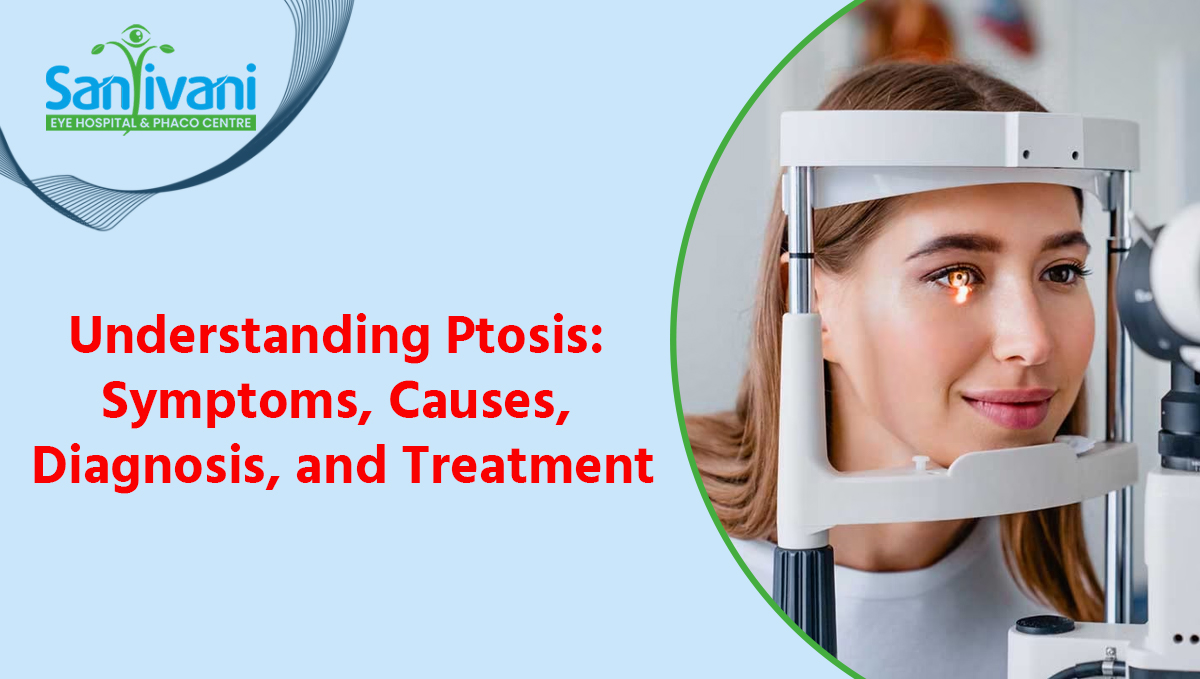
Understanding Ptosis: Symptoms, Causes, Diagnosis, and Treatment
Introduction
At Sanjivani Eye Hospital, we’re dedicated to providing comprehensive eye care and addressing a variety of eye conditions. One such condition that may impact vision and overall appearance is ptosis. This article aims to shed light on ptosis, covering its symptoms, causes, diagnosis, and treatment options.
What is Ptosis?
Ptosis, pronounced as "toe-sis," is a condition characterized by the drooping of one or both upper eyelids. This drooping can range from a minor inconvenience to a significant obstruction of vision. While ptosis can occur at any age, it is particularly concerning when it affects infants or impacts daily activities.
Symptoms of Ptosis
The primary symptom of ptosis is the drooping of the upper eyelid. Depending on the severity, this drooping can lead to:
- Partial or complete obstruction of vision : The eyelid may cover part or all of the pupil, affecting visual clarity.
- Eye fatigue : Straining to lift the eyelid can cause discomfort and fatigue.
- Head tilting or lifting : To compensate for the drooping eyelid, individuals might tilt their head back or raise their eyebrows excessively.
- Increased sensitivity to light : Some individuals with ptosis may experience discomfort in bright light.
Causes of Ptosis
Ptosis can arise from various causes, including:
1. Congenital Ptosis:
Present at birth, this form of ptosis is due to a developmental issue with the muscles responsible for lifting the eyelid.
- Muscle Weakness : Conditions like myasthenia gravis or muscular dystrophy can weaken the muscles controlling eyelid movement.
- Nerve Damage : Damage to the nerves, such as the oculomotor nerve, can impair eyelid function.
- Aging : As we age, the connective tissues and muscles may weaken, leading to drooping.
- Trauma or Injury : Physical injuries to the eye area can affect the eyelid muscles or nerves.
- Surgery : Previous eye or eyelid surgeries might result in ptosis as a complication.
2. Acquired Ptosis :
This can result from:
Diagnosis of Ptosis
Accurate diagnosis of ptosis involves a thorough evaluation by an eye specialist. At Sanjivani Eye Hospital, our diagnostic process includes:
- Medical History Review : Understanding the patient’s medical history and any symptoms they are experiencing.
- Physical Examination : Evaluating the eyelid’s position, eyelid function, and any associated symptoms.
- Imaging Tests : In some cases, imaging studies such as MRI or CT scans may be required to assess underlying causes.
- Special Tests : If a neurological condition is suspected, further tests may be conducted to evaluate nerve and muscle function.
Treatment Options for Ptosis
The treatment for ptosis depends on its cause, severity, and impact on the patient’s vision and daily life:
- Eyeglasses with Special Lenses : For some cases, specialized glasses that help lift the eyelid can be used.
- Medication : If ptosis is caused by a neurological or muscular condition, treating the underlying disorder may improve the ptosis.
1. Non-Surgical Treatments :
- Ptosis Surgery (Blepharoplasty) : This is a common and effective surgical procedure to correct drooping eyelids. The surgery involves tightening the muscles responsible for lifting the eyelid to restore a more natural position.
- Strabismus Surgery : If ptosis is associated with eye misalignment, additional procedures might be needed to address both issues.
2. Surgical Treatments :
Conclusion
Ptosis is a condition that can significantly impact quality of life, but with the right diagnosis and treatment, it can be effectively managed. At Sanjivani Eye Hospital in Ahmedabad, our team of experienced ophthalmologists is committed to providing personalized care to address ptosis and other eye conditions. If you or a loved one is experiencing symptoms of ptosis, don’t hesitate to schedule a consultation with us. Together, we can work towards restoring your vision and improving your quality of life.
Contact Us
For more information or to schedule an appointment, please contact Sanjivani Eye Hospital at, or visit our website. Your vision and eye health are our top priorities.